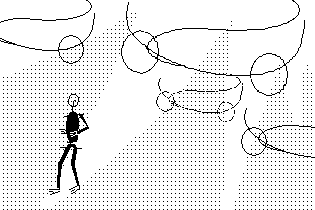 The
original Japanese haiku 「走るなら歩く」by 鈴木伸一
The
original Japanese haiku 「走るなら歩く」by 鈴木伸一秋天広しみんなが走るなら歩く
The English translation by hoo
the vast fall sky_
if all others run,
I'll walk!
The EL translation
Recently I often walk there and back if the place is less than 4km away.
I can see much more sky and corners of the town, which we can't see when running.
This haiku, "I'll walk" is by Suzuki Shin'ichi: the father of Suzuki Hidaka,
who wrote "Scarecrow" haiku, which I introduced last fall.
This haiku has been for years in the collection of a father's and his son's haiku
of [Karakkaze Haiku Land of Suzuki Shin'ichi]
Now the world is speeding up more, and by contraries some people started appreciating walking.
I'm a sort of person who walks even if all others run,
so I wonder how the senior Suzuki does, if all others start walking.
* Through this translation, you'll see an example to use EL definition brackets for a sentence included (if..,). The EL expression way for this purpose has been more rationally changed recently.わたしは近頃4キロ程度の遠さならよく歩いて往復します。
大空もその下に展開する街の隅も、走っていては見えないものが歩くと見えます。
今月の「走るなら歩く」は、昨年の同じ月にご紹介したカカシの俳句の
鈴木日高さんのお父さん、鈴木伸一さんの作品です。
鈴木伸一の空っ風俳句ランド「父と子の俳句作品集」の中にあり、
何年も前に「吟遊」第24号に掲載された句だそうです。
時代はますます加速を増し、逆に歩く価値を見出す人々も出てきました。
私は「みんなが走っても歩く」人ですが、
鈴木さんはもしみんなが歩きだせばどうされるのでしょう。
* 今回は表意カッコを使う「もし~なら」の地球語表現にご注目ください。
以前に挙げていた文例よりも合理的に最近表現の仕方を少し変更しました。
 The
original Japanese haiku 「走るなら歩く」by 鈴木伸一
The
original Japanese haiku 「走るなら歩く」by 鈴木伸一
秋天広しみんなが走るなら歩く
The English translation by hoo
the vast fall sky_
if all others run,
I'll walk!
The EL translation
![]()
![]()
![]()
![]()
![]()
![]()
![]()
![]()
![]()
![]()
![]()
![]()
![]()
![]()
![]()
![]()
The symbols in the pictograph:
![]() : car (車),
: car (車), ![]() :
I/my/me (私),
:
I/my/me (私), ![]() :
shoulder (肩),
:
shoulder (肩), ![]() :
hand (手),
:
hand (手), ![]() : legs
(脚),
: legs
(脚), ![]() : foot (足)
: foot (足)
The symbols in the EL translation:
![]() {
{![]() {
{![]() nature,
nature,
![]() time} season (季節),
time} season (季節),
![]() down}: fall (as a season) (秋)
down}: fall (as a season) (秋)
![]() {
{![]() nature,
nature, ![]() space}:
the sky (as the fundamental character) (空)
space}:
the sky (as the fundamental character) (空)
![]() {
{![]() condition,
condition,
![]() verb-mark}: (状態表現の動詞符)
verb-mark}: (状態表現の動詞符)
![]() {
{![]() much,
much, ![]() space}: vast (広大)
space}: vast (広大)
![]()
![]() (plural dots): to show a pause (感嘆などの休止)
(plural dots): to show a pause (感嘆などの休止)
![]() {
{![]() (tentative),
(tentative),
![]() preposition-mark) + definition bracket} (a sentence)
preposition-mark) + definition bracket} (a sentence) ![]() :
:
if ...(the sentence in the brackets), modifying the predicate of the main sentence)
(仮に~(文)なら)
In case of saying "even if..," add ![]() to enhance "if.." as
to enhance "if.." as ![]() .
.
(仮に~(文)でさえという場合には、さらに強めの記号を重ねます)
![]() {outward, point} (as a
fundamental character): other (他)
{outward, point} (as a
fundamental character): other (他)
![]() {
{![]() all,
all,
![]() human/people}: all people (みんな)
human/people}: all people (みんな)
![]() : verb-mark (動詞符)
: verb-mark (動詞符)
![]() {
{![]() legs (as a picture-like character),
legs (as a picture-like character), ![]() go}:
running,
go}:
running, ![]()
![]() :
run (走る)
:
run (走る)
![]() : the subject
indicator (It is only used when the subject of a sentence is not at the
beginning of a sentence) (文頭にない主語の標識)
: the subject
indicator (It is only used when the subject of a sentence is not at the
beginning of a sentence) (文頭にない主語の標識)
![]() {
{![]() pronoun,
pronoun,
![]() back} (pointing at
the chest in this hand-sign}: I (/my/me) (私)
back} (pointing at
the chest in this hand-sign}: I (/my/me) (私)
![]() {
{![]() verb-mark
with
verb-mark
with ![]() will}: will
do...(意思で~する)
will}: will
do...(意思で~する)
![]() {
{![]() foot/feet
(as a picture-like character,
foot/feet
(as a picture-like character, ![]() go}:
walk (n.)
go}:
walk (n.) ![]()
![]() :
walk (vi.) (歩く)
:
walk (vi.) (歩く)